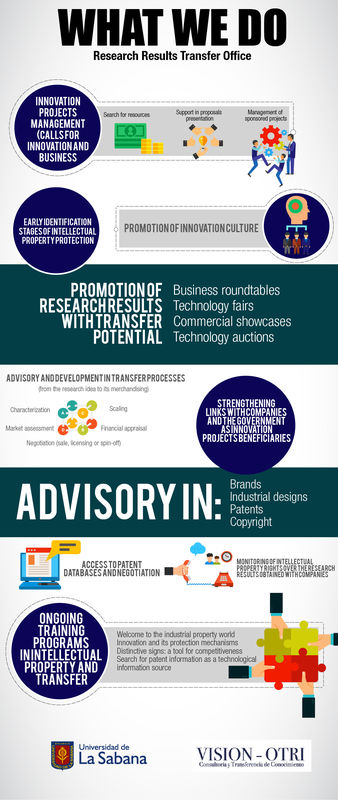VISION-OTRI
We are the Consulting and Knowledge Transfer Unit of Universidad de La Sabana, aimed at achieving a social impact through the growth and development of the different productive sectors of Colombian society. Our primary task lies in developing special projects for each University unit and meeting the needs of the productive, public and social sectors, resulting in a positive impact in our society.
DIRECTOR GENERAL: Adriana del Pilar Sacipa Gómez
Email address: adriana.sacipa1@unisabana.edu.co

The OTRI unit evaluates, enhances, assesses, promotes, disseminates and transfers the research results of its research groups in order to strengthen the University innovation capacities while enhancing bonds with the actors of the innovation ecosystem, generating employment and creating technology-based companies.


The Sustainable Sabana Centro program is an initiative of Universidad de La Sabana, as part of its substantive functions, devoted to contribute to the co-construction of a Regional Sustainability Ecosystem addressed to Sabana Centro zone, comprised by Chía, Cota, Cajicá, Tabio, Tenjo, Tocancipá, Sopó, Gachancipá, Cogua, Nemocón and Zipaquirá municipalities. This program seeks to project the Faculties and Academic Units knowledge, contributing to the municipalities’ economic and social development and the building of a closer relationship with their inhabitants and institutions.
The first stage of this program, consisted of the ESCI (Emerging and Sustainable Cities Initiative) methodology application developed by the Inter-American Development Bank (IDB), to make a diagnosis of the competitiveness of the region and to create a path towards its sustainability.
As a result, in 2015 the University published the first outcome report for a sustainable and competitive region.
Email adress: juan.camelo@unisabana.edu.co

The CEIS is a unit where students, graduates, professors, administrative staff and entrepreneurship and innovation actors of the Influence Zone of Universidad de La Sabana find an opportunity to think up, develop and enhance their entrepreneurship and innovation proposal, through actions that embrace human development (the person), the idea (entrepreneurship), and the value proposition (innovation).
Who is the SEIS target audience?
The CEIS is a unit of Universidad de La Sabana, in charge of the incubation and acceleration of entrepreneurships and entrepreneurs, through experiences that integrate the CEIS incubation model consisting of ensuring the success of entrepreneurial projects.
In this way, the CEIS intends to provide an integral incubation model that allows raising awareness, promoting, training, supporting and strengthening processes, while fostering entrepreneurship and innovation and promoting the social and economic development of the University’s Zone of influence and the country.
Email Address: olga.escobar1@unisabana.edu.co

Universidad de La Sabana understands Social Outreach as the Institution capacity of projecting its teaching and research substantive functions towards its surroundings, resulting in a positive impact on society and the Institution continuous improvement.
DIRECTOR OF SOCIAL OUTREACH: Juan Carlos Camelo Vargas
Email address: juan.camelo@unisabana.edu.co

Another Institutional key front is the social outreach activities documentation process carried out by the University through its academic units. The Social Outreach reports are an annual publication where different projects, initiatives and acknowledgments are compiled, among other outstanding activities in which teachers, managers, administrative personnel and students have participated and achieved an important impact in the community.
Learn more about the different outreach activities conducted by the University:Memories of Social Outreach (spanish)

For several years, Universidad de La Sabana has devoted to its interdisciplinary academic, research and social outreach activities, in an effort to create a fairer, peaceful and solidary society, not only due to the historic moment Colombia is facing around peace, but also the compelling need to build a better country for all.
In this way, the University, from its various work fronts, has included peace-related subjects to the curriculum; resulting in several research projects in collaboration with public and private entities. Additionally, a significant number of academic events, lectures and publications in national settings have been derived from this subject.
The Institution, ensuring its active participation within the post-conflict process the country is facing, has been collaborating with several state entities such as the Colombian Agency for Reintegration and the National Center for Historical Memory. This participation seeks to join forces with the government through the signing of Inter-institutional cooperation agreements in order to build peace. In the same way, The University has led public awareness projects with national media intended to find effective ways to spread peace and reconciliation.
The University has also partnered with international experts, such as the Carter Center in Atlanta and USA, intervening communities affected by the armed conflict and searching for successful formulas that lead not only to intervene in the current scenario, but in the construction of a new society in which educational institutions play a key role.
Enlazados por La Paz-Summit on Peace Building
In the last few years, Colombia has set an important example in conflict resolution and peacebuilding. For this reason, seven Colombian academic institutions, supported by the US Embassy, are working together for the Enlazados por la Paz – Summit on Peacebuilding.
Mission
This initiative emerges with the intention of promoting and encouraging the creation of spaces for positive conversation and academic cooperation, thus contributing to peacebuilding in Colombia. This is especially relevant during the current post-conflict period.
Moreover, this initiative highlights the role of higher education in the process of social transformation.


